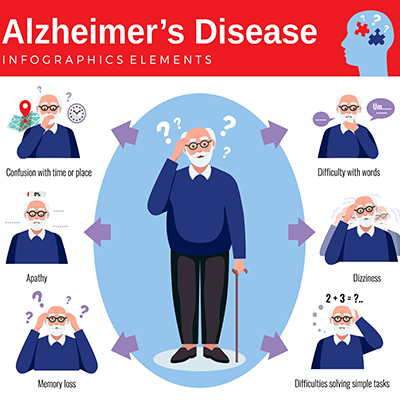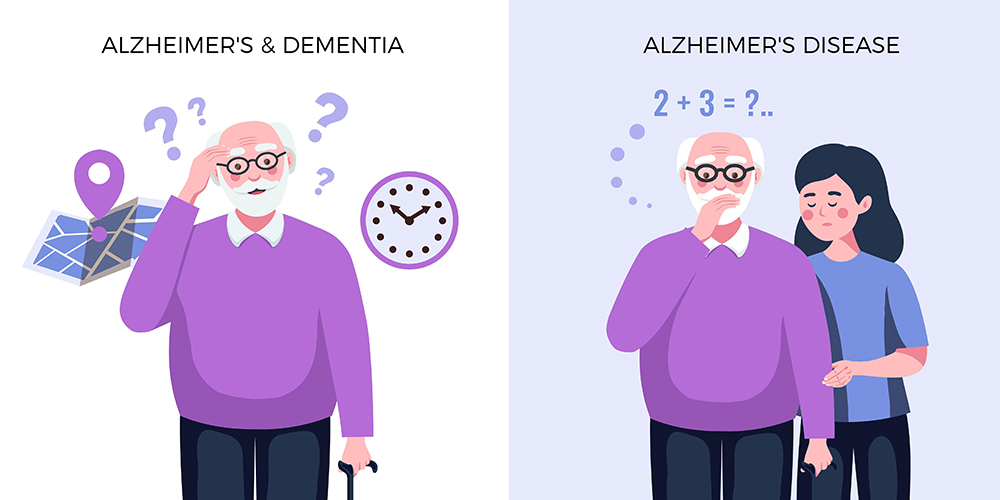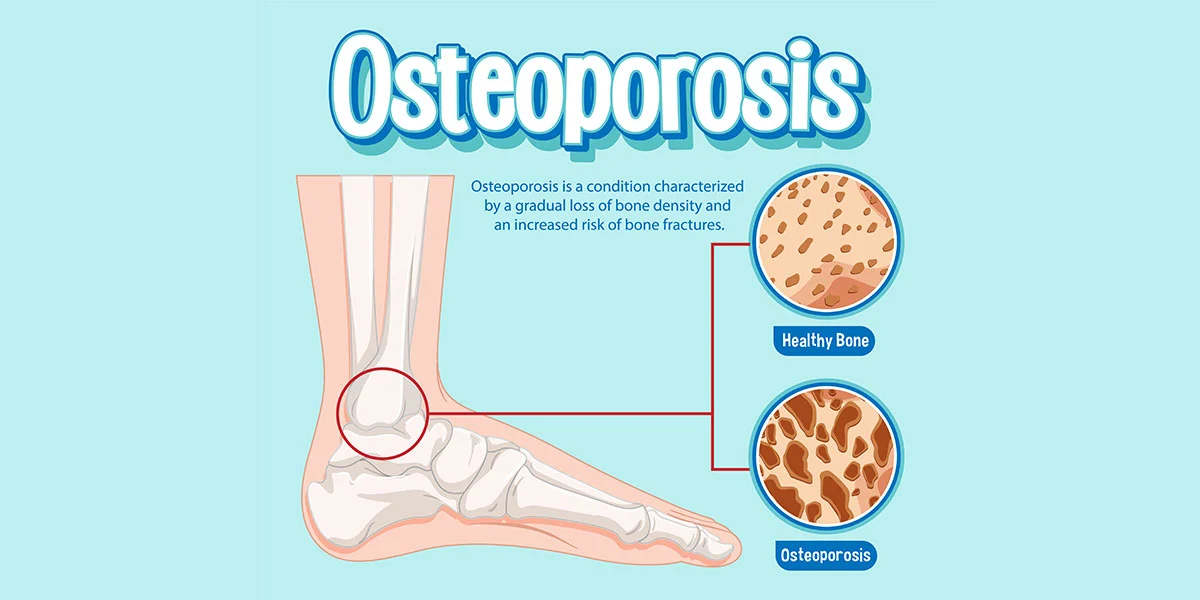Alzheimer’s Disease: is a progressive neurodegenerative disorder that primarily affects the brain’s cognitive functions, particularly memory, thinking, and behavior. It is the most common cause of dementia, a general term for a decline in cognitive ability severe enough to interfere with daily life.
The disease is characterized by the accumulation of abnormal protein aggregates, such as beta-amyloid plaques and tau tangles, within the brain. These aggregates lead to the loss of neurons and the disruption of neural communication, resulting in the cognitive and behavioral symptoms associated with Alzheimer’s disease.
Types of Alzheimer’s Disease
Alzheimer’s disease is generally categorized into two main types: early-onset Alzheimer’s disease and late-onset Alzheimer’s disease. These types are primarily distinguished by the age at which symptoms start to appear and some underlying genetic factors. Additionally, there are a few subtypes of Alzheimer’s disease that are less common but exhibit distinct characteristics.
Here’s an overview of the types:
- Early-Onset Alzheimer’s Disease: This type of Alzheimer’s occurs before the age of 65. It is relatively rare, accounting for a small percentage of all Alzheimer’s cases. Genetic mutations play a more significant role in early-onset Alzheimer’s, with mutations in genes like APP, PSEN1, and PSEN2 contributing to its development. Symptoms are similar to those of late-onset Alzheimer’s but may progress more rapidly.
- Late-Onset Alzheimer’s Disease: This is the most common form of Alzheimer’s disease and typically occurs after the age of 65. While there can be genetic factors that increase the risk, it’s generally considered to be influenced by a combination of genetic, environmental, and lifestyle factors.
Subtypes of Alzheimer’s Disease:
- Familial Alzheimer’s Disease (FAD): This refers to cases of Alzheimer’s disease that are directly inherited within families. FAD is associated with mutations in specific genes that increase the risk of developing the condition. It can occur in both early-onset and late-onset cases.
- Early-Onset Familial Alzheimer’s Disease (EOFAD): As the name suggests, this subtype of Alzheimer’s is a familial form that strikes individuals before the age of 65. Mutations in genes like APP, PSEN1, and PSEN2 are known to cause EOFAD.
- Late-Onset Familial Alzheimer’s Disease (LOFAD): LOFAD is a subtype of familial Alzheimer’s that occurs after the age of 65. It is associated with a genetic variant known as APOE ε4, which increases the risk of developing Alzheimer’s disease. However, it’s important to note that not everyone with this genetic variant will develop the disease.
- Sporadic Alzheimer’s Disease: This is the most common form of Alzheimer’s, making up the vast majority of cases. It occurs without any obvious family history of the disease and is influenced by a combination of genetic, environmental, and lifestyle factors.
It’s important to remember that Alzheimer’s disease is a complex condition with a range of factors contributing to its development. Genetic predisposition, lifestyle choices, and other variables can all play a role in the onset and progression of the disease.
Symptoms of Alzheimer’s Disease
Alzheimer’s disease is characterized by a gradual decline in cognitive and functional abilities. The symptoms can vary from person to person and often worsen over time as the disease progresses.
Common symptoms of Alzheimer’s disease include:
- Memory Loss: One of the most noticeable early symptoms is difficulty remembering recent events, names, and conversations. This may involve forgetting important dates, appointments, or locations.
- Difficulty with Familiar Tasks: Individuals might struggle to perform tasks that were once routine and familiar, such as cooking, managing finances, or using household appliances.
- Language Problems: Finding the right words, following or participating in conversations, and repeating statements or questions can become challenging.
- Disorientation and Confusion: People with Alzheimer’s may become disoriented in time and place. They might not recognize familiar surroundings, people, or even their own reflection.
- Impaired Judgment: Decision-making and reasoning abilities decline, leading to poor judgment, inappropriate behavior, and difficulty planning or solving problems.
- Trouble with Abstract Thinking: Concepts that involve abstract thinking, such as numbers or the concept of time, can become confusing.
- Misplacing Items: Individuals may put things in unusual places and struggle to retrace their steps to find them.
- Mood and Personality Changes: Mood swings, increased irritability, anxiety, and depression can occur. Individuals might become withdrawn or exhibit changes in personality.
- Loss of Initiative: A decrease in motivation and initiative to start activities, engage in hobbies, or socialize can be observed.
- Difficulty Recognizing Familiar Faces: Individuals may have difficulty recognizing familiar faces, including those of family and close friends.
- Problems with Self-Care: Personal hygiene and self-care routines might be neglected, requiring assistance or reminders.
- Withdrawal from Social Activities: People with Alzheimer’s may withdraw from social activities and hobbies they once enjoyed due to the challenges they face.
It’s important to note that Alzheimer’s disease is progressive, and symptoms can worsen over time. Early detection and diagnosis are crucial for managing the condition and providing appropriate care. If you or someone you know is experiencing any of these symptoms, especially if they interfere with daily functioning, seeking medical evaluation is recommended. An early diagnosis can lead to better management and planning for the future.

Causes of Alzheimer’s Disease
The exact cause of Alzheimer’s disease is not fully understood, but it is likely the result of a combination of genetic, environmental, and lifestyle factors. Research indicates that changes in the brain, including the accumulation of abnormal proteins, play a significant role in the development of the disease.
Here are some key factors that are believed to contribute to the development of Alzheimer’s disease:
- Amyloid Plaques: One of the hallmarks of Alzheimer’s disease is the accumulation of beta-amyloid plaques in the brain. These plaques are formed by the buildup of a protein called beta-amyloid. It’s thought that the accumulation of these plaques disrupts normal brain function and contributes to cognitive decline.
- Tau Tangles: Tau is another protein found in the brain, and in Alzheimer’s disease, abnormal tau tangles form within nerve cells. These tangles can disrupt the transportation of nutrients and other essential materials within neurons, leading to their dysfunction and death.
- Neuroinflammation: Chronic inflammation in the brain is believed to contribute to the progression of Alzheimer’s disease. Immune cells that respond to inflammation may damage healthy neurons and exacerbate the disease’s effects.
- Genetic Factors: While most cases of Alzheimer’s disease are not directly inherited, certain genetic mutations can increase the risk of developing the condition. Mutations in genes such as APP, PSEN1, PSEN2, and APOE ε4 have been linked to the development of Alzheimer’s disease.
- Age: Advanced age is the most significant risk factor for Alzheimer’s disease. The risk of developing the disease increases with age, and most cases occur in individuals over 65.
- Family History: Having a family history of Alzheimer’s disease, especially among first-degree relatives (parents or siblings), can increase the risk of developing the condition.
- Down Syndrome: People with Down syndrome have a higher risk of developing Alzheimer’s disease, often at an earlier age than the general population.
- Cardiovascular Risk Factors: Conditions that affect cardiovascular health, such as high blood pressure, high cholesterol, and diabetes, have been associated with an increased risk of Alzheimer’s disease.
- Environmental Factors: Some environmental factors, such as exposure to certain toxins, air pollution, and a lack of physical and mental activity, have been suggested to contribute to the risk of developing Alzheimer’s disease.
- Head Trauma: Severe head injuries, especially repeated concussions, have been linked to a higher risk of developing Alzheimer’s disease later in life.
It’s important to note that while these factors play a role in the development of Alzheimer’s disease, the exact interplay between them and the disease’s progression is still being researched. Additionally, ongoing studies are investigating potential ways to prevent or slow the development of Alzheimer’s through lifestyle interventions, medication, and other approaches.





